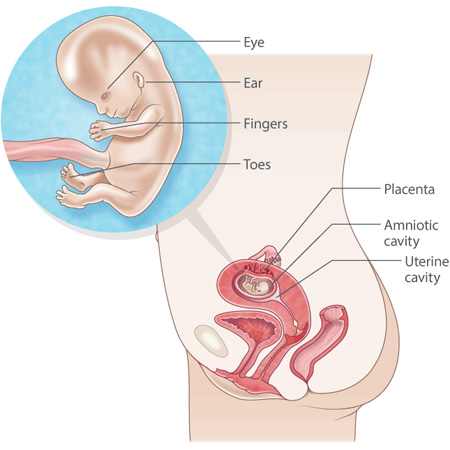You at 12 weeks pregnant
Your uterus shifts upwards about now, relieving the pressure on your bladder. For a little while at least, you probably won’t need to go to the toilet so often.
You might start feeling a little less tired now – or you could still feel very low on energy.
You might notice darker patches of skin on your face or neck. This is called ‘chloasma’ (or the ‘mask of pregnancy’), and it’s normal. Also normal is the linea nigra, a darker line that shows up on the skin of your belly, running from your belly button to your pubic area. You might see it now or later in your pregnancy. Chloasma and the linea nigra are caused by hormonal changes that increase the amount of melanin in your body.
You’ll probably have your first pregnancy care visit around this time, as well as the 12-week ultrasound.

Why antenatal appointments matter
It’s important to go to your antenatal appointments right from the start, so your doctor or midwife can see how you and your baby are going and you can talk about any concerns you might have. If there’s a problem, usually it can be picked up and treated or checked. Certain tests are also recommended at certain times.
Antenatal appointments are a good chance to get health and lifestyle support if you need it and to get information about your pregnancy, labour, birth and early parenting. If there’s something that’s worrying you, you can talk about that too.
If you want only female health professionals to care for you during pregnancy, labour and birth, you can ask for a female midwife or doctor. It might not be possible to have one though – especially if you or your baby need urgent or specialised medical attention.
Getting an interpreter or multicultural health worker
If you’re not confident speaking English, ask for an interpreter. If one isn’t available in person, ask whether you can have a phone interpreter. You don’t have to pay to use an interpreter.
You might also be able to get help from a multicultural health worker to do things like book or check your appointments, fill out forms, and get transport to your appointments. Ask whether there’s a multicultural health worker available.
Your baby eats and drinks what you eat and drink
The placenta is working now, sending oxygen and nutrients through the umbilical cord and taking waste products away.
Most things that you eat and drink pass through to your baby. This is why you need to eat healthy food, not have too many caffeinated drinks – like coffee, tea and energy drinks – and quit alcohol and other non-prescribed drugs.
You also need to check with your doctor or midwife that any medicines you’re taking and skincare products you’re using are safe for pregnancy. Medicines include prescribed medicines, natural supplements and medicines from chemists and supermarkets.
Other things that you might take in, like cigarette smoke, pass through to your baby as well, even when you’re around other people who are smoking.
If you need support to quit smoking or vaping, ask your doctor or midwife for help or call Quitline on 137 848. You can also check out our illustrated guide to smoking, vaping and pregnancy.
Your baby when you’re 12 weeks pregnant
Here’s what’s happening with your baby:
- Your baby is about 6 cm long from head to bottom and weighs about 18 g.
- The kidneys are working, and your baby can pass urine and swallow amniotic fluid.
- Your baby’s chest rises and falls, practising breathing movements. The digestive system is also in test mode.
- Your baby now has 20 teeth in their gums.